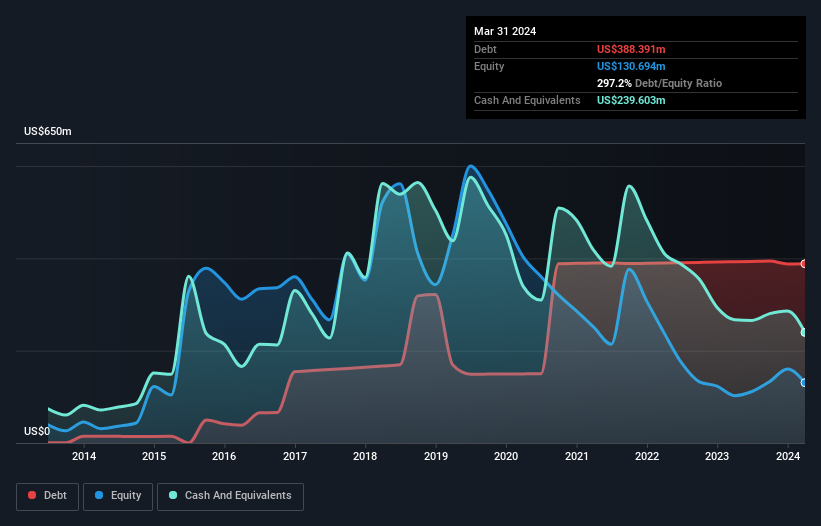- United States
- /
- Biotech
- /
- NasdaqGM:FOLD
Here's Why Amicus Therapeutics (NASDAQ:FOLD) Can Afford Some Debt
Legendary fund manager Li Lu (who Charlie Munger backed) once said, 'The biggest investment risk is not the volatility of prices, but whether you will suffer a permanent loss of capital.' So it seems the smart money knows that debt - which is usually involved in bankruptcies - is a very important factor, when you assess how risky a company is. We can see that Amicus Therapeutics, Inc. (NASDAQ:FOLD) does use debt in its business. But is this debt a concern to shareholders?
What Risk Does Debt Bring?
Debt is a tool to help businesses grow, but if a business is incapable of paying off its lenders, then it exists at their mercy. Part and parcel of capitalism is the process of 'creative destruction' where failed businesses are mercilessly liquidated by their bankers. While that is not too common, we often do see indebted companies permanently diluting shareholders because lenders force them to raise capital at a distressed price. Of course, plenty of companies use debt to fund growth, without any negative consequences. When we examine debt levels, we first consider both cash and debt levels, together.
View our latest analysis for Amicus Therapeutics
What Is Amicus Therapeutics's Debt?
The chart below, which you can click on for greater detail, shows that Amicus Therapeutics had US$388.4m in debt in March 2024; about the same as the year before. On the flip side, it has US$239.6m in cash leading to net debt of about US$148.8m.

How Strong Is Amicus Therapeutics' Balance Sheet?
We can see from the most recent balance sheet that Amicus Therapeutics had liabilities of US$142.1m falling due within a year, and liabilities of US$449.0m due beyond that. On the other hand, it had cash of US$239.6m and US$76.4m worth of receivables due within a year. So its liabilities outweigh the sum of its cash and (near-term) receivables by US$275.1m.
Since publicly traded Amicus Therapeutics shares are worth a total of US$3.00b, it seems unlikely that this level of liabilities would be a major threat. But there are sufficient liabilities that we would certainly recommend shareholders continue to monitor the balance sheet, going forward. The balance sheet is clearly the area to focus on when you are analysing debt. But it is future earnings, more than anything, that will determine Amicus Therapeutics's ability to maintain a healthy balance sheet going forward. So if you're focused on the future you can check out this free report showing analyst profit forecasts.
In the last year Amicus Therapeutics wasn't profitable at an EBIT level, but managed to grow its revenue by 26%, to US$423m. With any luck the company will be able to grow its way to profitability.
Caveat Emptor
Despite the top line growth, Amicus Therapeutics still had an earnings before interest and tax (EBIT) loss over the last year. Indeed, it lost US$58m at the EBIT level. When we look at that and recall the liabilities on its balance sheet, relative to cash, it seems unwise to us for the company to have any debt. So we think its balance sheet is a little strained, though not beyond repair. Another cause for caution is that is bled US$88m in negative free cash flow over the last twelve months. So suffice it to say we do consider the stock to be risky. There's no doubt that we learn most about debt from the balance sheet. But ultimately, every company can contain risks that exist outside of the balance sheet. For example - Amicus Therapeutics has 1 warning sign we think you should be aware of.
If, after all that, you're more interested in a fast growing company with a rock-solid balance sheet, then check out our list of net cash growth stocks without delay.
New: Manage All Your Stock Portfolios in One Place
We've created the ultimate portfolio companion for stock investors, and it's free.
• Connect an unlimited number of Portfolios and see your total in one currency
• Be alerted to new Warning Signs or Risks via email or mobile
• Track the Fair Value of your stocks
Have feedback on this article? Concerned about the content? Get in touch with us directly. Alternatively, email editorial-team (at) simplywallst.com.
This article by Simply Wall St is general in nature. We provide commentary based on historical data and analyst forecasts only using an unbiased methodology and our articles are not intended to be financial advice. It does not constitute a recommendation to buy or sell any stock, and does not take account of your objectives, or your financial situation. We aim to bring you long-term focused analysis driven by fundamental data. Note that our analysis may not factor in the latest price-sensitive company announcements or qualitative material. Simply Wall St has no position in any stocks mentioned.
About NasdaqGM:FOLD
Amicus Therapeutics
A biotechnology company, focuses on discovering, developing, and delivering novel medicines for rare diseases in the United States and internationally.
Undervalued with reasonable growth potential.
Similar Companies
Market Insights
Community Narratives



